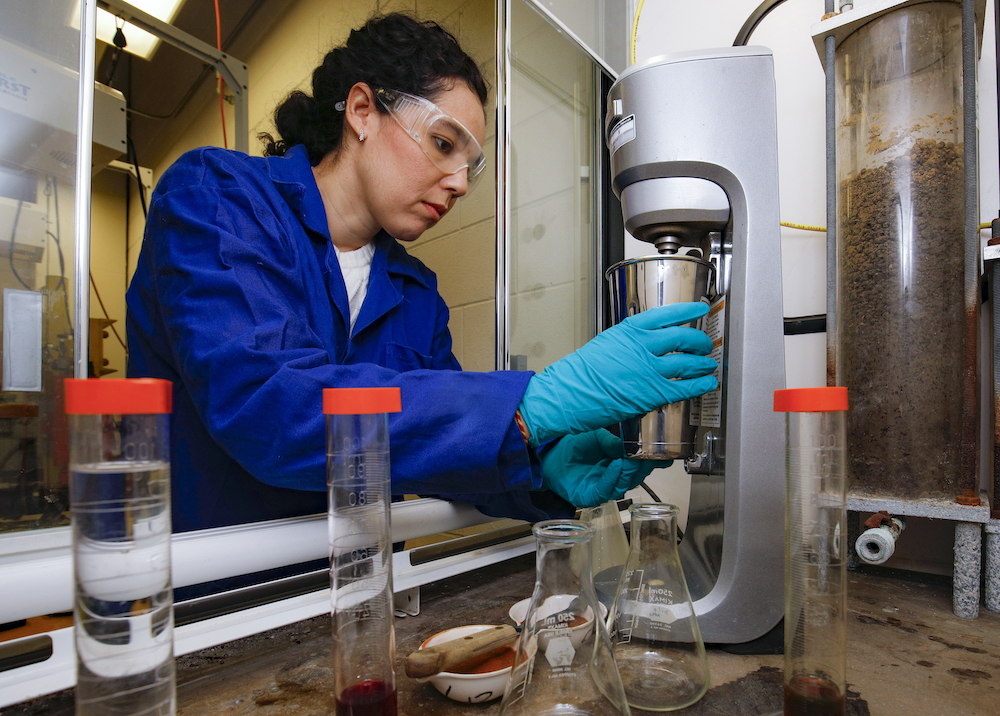MS in Materials Engineering
intro

Materials—including metals, intermetallics, polymers, ceramics, composites, and electronic materials—are critical to modern industrial society. Materials engineering is an expansive field that encompasses many specialties and offers rich opportunities for interdisciplinary collaboration.
Materials engineering addresses the design, manufacture, and characterization of materials for specific applications. Materials development is an enabling step to the production of advanced engineering devices. Materials selection is a key element in the design, manufacturing, and quality control of structures and devices.
Because UIC and many other universities do not offer an undergraduate program in materials engineering, it is common for students with degrees in relevant subjects other than materials engineering to pursue this degree and enter the field. Our faculty help our graduate students in materials engineering to design an individualized academic program that makes use of the strengths in their background and gives them the knowledge and skills needed to move forward.
The MS in Materials Engineering is offered as a thesis option, a research-oriented degree that provides research experience and potential pathways toward research sponsorship or other funding, or a coursework-only option.
The areas of concentration for this master’s program are:
MS in Materials Engineering
1
Topics of focus in the materials processing and characterization concentration include:
- Corrosion
- Crystallography and x-ray diffraction
- Materials synthesis and processing
- Polymer science and engineering
- Principles of deformation processing
- Processing and properties of ceramic materials
- Structure and properties of composite materials
- Welding
2
Topics of focus in the mechanics of solids concentration include:
- Continuum mechanics
- Elasticity
- Finite elements
- Fracture mechanics
- Mechanics of composite materials
- Plasticity
- Viscoelasticity
- Wave propagation
MS in Materials Engineering Curriculum
The curriculum requirements for the MS in Materials Engineering vary based on whether students select the thesis option or the coursework-only option. Expand the sections below to view the curriculum plan for each option.
details
GPA Graduation Requirement: A GPA of 3.0 or greater is required to graduate with an MS Degree.
Required credit hours: 36, grades of “D” will not count towards the credit hour requirement.
Credit hours from coursework: 24
Credit hours from thesis research: 12
As part of their 24 credit hours of coursework, MS thesis students must complete a minimum of 12 credits from 500-level courses. Of these 12 credits, 8 must be from courses with CME course codes, excluding CME 596, and 4 may come from either CME or COE courses, excluding CME 596 or its equivalent.
The remaining 12 credit hours of coursework must come from 400-level or 500-level CME or COE courses. Only one instance of CME 596 or its equivalent will be accepted toward graduation. CME 496 or its equivalent does not count for graduation credit, and 400-level ENGR courses are not accepted. Any course outside of the College of Engineering must receive prior approval from the academic advisor.
The 12 credit hours of research come from enrolling in CME 598.
details
GPA Graduation Requirement: A GPA of 3.0 or greater is required to graduate with an MS Degree.
Required credit hours: 36, grades of “D” will not count towards the credit hour requirement.
Credit hours from coursework: 36
As part of their 36 credit hours of coursework, MS course-work only students must complete a minimum of 12 credits from 500-level courses. Of these 12 credits, 8 must be from courses with CME course codes, excluding CME 596, and 4 may come from either CME or COE courses, excluding CME 596 or its equivalent.
The remaining 24 credit hours of coursework must come from 400-level or 500-level CME or COE courses. Only one instance of CME 596 or its equivalent will be accepted toward graduation. CME 496 or its equivalent does not count for graduation credit, and 400-level ENGR courses are not accepted. Any course outside of the College of Engineering must receive prior approval from the academic advisor.
MS Students in Their Own Words

Samuel Mermall ’21
MS in Materials Engineering
Why did you choose UIC? UIC is part of an excellent state university system in the heart of an amazing city that I call home. It caters academically to my passions and gives me the flexibility I need as a full-time working professional.
What do you hope to be doing right after graduation? Innovating in the battery space and helping to commercialize advanced, economically sound, and sustainable energy storage.
How is UIC preparing you for your future goals? There is so much to say, from the hard science education to project accounting. My courses at UIC are preparing me to be a holistic leader who will solve interesting challenges at the intersection of technology, business, and science.
The best trip/vacation you’ve ever taken, and why: A scuba diving trip to Palau. Scuba diving is one of my passions, and getting to do it all day every day in one of the most beautiful places on Earth was almost too good to be true.
What do you suggest a newcomer to Chicago see or do if they’ve already seen Navy Pier, the Riverwalk, and Skydeck? Explore the many amazing neighborhoods Chicago has to offer! There is so much to do, see, and taste in this culturally rich city.
Chu

Chu Wang ’21
MS in Materials Engineering
What is your academic area of focus within your department? Atomistic modeling of deformation processes in materials.
Have you worked in any labs? Yes, the Advanced Materials and Microstructures Lab.
Looking broadly at your field of study, who is the person you admire the most, and why? Dr. Lu Ke. He is the youngest academic in China who does experimental studies on nanostructured metals and alloys.
Favorite restaurant in Chicago, and why: Happy lamb Hot Pot. It has the most popular food in China.
For international students: Is there anything in Chicago that reminds you of home? We have Chinatown, so absolutely!